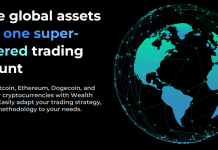 The financial markets have remained volatile, especially during this last financial year, and with that, they have also become more accessible to beginner investors and traders. And, as a result, there is a lot of renewed interest in investing and trading of all kinds.
The financial markets have remained volatile, especially during this last financial year, and with that, they have also become more accessible to beginner investors and traders. And, as a result, there is a lot of renewed interest in investing and trading of all kinds.
If you’re just starting out, the mass adoption of contract for difference trading will really make you appreciate the advantages of trading CFDs. For example, starting to invest during a recession, or whilst the stock market has crashed, can reap many benefits, although it isn’t always as easy as waiting for the stock price to fall, buying said stock and then selling when you have made a profit. There are many factors to consider, in order to avoid making investment mistakes that’ll waste time and your hard-earned money.
Continue reading to learn about the top investing mistakes that are made by beginners, and how you can avoid them and hit the ground running when trading.
Not Investing at the Right Time
This is one of the most common mistakes made by beginner investors. It seems quite simple, but following the traditional method, most people keep their money in a bank account and wait too long before investing it, meaning they miss out on a lot of great deals.
A survey conducted by Forbes found:
“66% of people aged 18-29 (and 65% of those 30 to 39) say investing in the stock market is scary or intimidating, compared with 58% of those aged 40 to 54 and 57% of those 55 and older.”
This shows that the younger generations are less inclined to invest and trade. In order to maximise your funds and surpass the rate of inflation, doing your due diligence and finding something worth investing in, will go a long way for you in terms of financial security.
The main reason that waiting to invest is a mistake is because of inflation – as cash steadily loses its purchasing power at a rate of roughly two percent per year. This means that over the next 30 years, uninvested cash will have lost over half of its value. Ultimately you must aim for your money to grow at a rate faster than two percent in order to outpace inflation. So, make a plan, do the research and get investing!
Emergency Fund
 Moving on, not having an emergency fund is another common mistake made by first-time investors. It’s really important to build up a reserve of cash that you can tap into whenever you get hit by an emergency expense. The last thing you want to do is sell your investments just for extra cash to cover an unforeseen expense.
Moving on, not having an emergency fund is another common mistake made by first-time investors. It’s really important to build up a reserve of cash that you can tap into whenever you get hit by an emergency expense. The last thing you want to do is sell your investments just for extra cash to cover an unforeseen expense.
The key here is that you don’t try to run before you can walk; you need to have an emergency fund before you start seriously investing, in order to protect yourself in the future.
Not Considering Taxes
Taxes are going to be your single biggest expense in your lifetime. Minimising your tax bill as much as you can is a no-brainer. The best way to do this is investing with the right type of accounts. These can be tax free accounts or low taxation rate accounts. It is essential to do your due diligence before selecting an account to use when investing your money.
Typically, whenever you invest, you have to pay income taxes on dividends and interest payments, plus you have to consider capital gains taxes on any profits made on your investments. With tax rates ranging from 20-40 percent, taxes will take a large portion of the money you make and have for yourself from investments.
Just by using a tax free or tax advantaged account, you can give yourself a 20-40 percent head start. As a beginner investor, try and find an exchange or brokerage account that allows you to start off by keeping a large portion of your money, instead of paying out potentially massive amounts of tax.
—
Regardless of the route you choose to go down, it’s better to invest sooner rather than later, and take into consideration the mistakes that can easily be made. Make sure that you conduct as much research as possible, to ensure that you have a shot at a secure financial future and to beat future inflation.








![Reltex Group Reviews: Explore business opportunities by Trading [reltexg.com]](https://comparic.com/wp-content/uploads/2023/12/image001-218x150.jpg)
![Mayrsson TG Reviews: Why Choose Crypto-Trading with Them? [mayrssontg.com]](https://comparic.com/wp-content/uploads/2023/12/image1-218x150.jpg)








